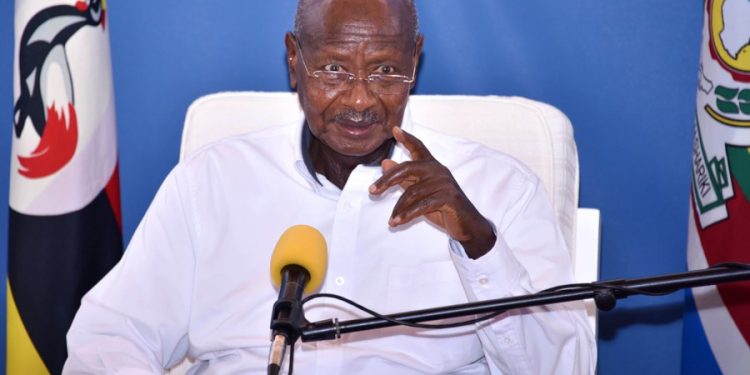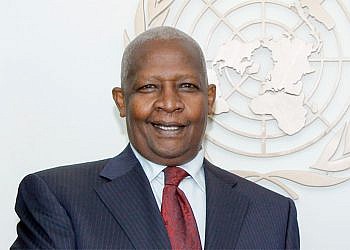President Museveni has reiterated his call to Ugandans to create wealth through commercial agriculture with calculation.
“Some of the people don’t know our history very well but this part of the world is mainly a place of wealth creators. In the villages, if you don’t work for wealth, they call you a vagabond,” he said.
The President made the appeal on Thursday during his presidential address on wealth creation, held at State Lodge, Nakasero.
He said that the NRM government emphasises politics of economics and wealth creation and they have always urged people to be wealth creators and reject the politics of sectarianism.
“As a wealth creator, there’s no Ugandan I don’t like, I love all Ugandans because they buy my products like milk,
bananas. How can I have any Ugandan whom I don’t like? But then you find that in Uganda the market is not enough, we need the regional market so that is why we inevitably as far as wealth
creation is concerned, had to automatically be patriots by loving Uganda and Pan- Africanists; love the whole of Africa. That is how we evolved the four principles of the NRM; Patriotism, Pan- Africanism, socio-economic transformation and democracy,” he said.
Museveni explained that Uganda can be very successful if it develops its indigenous wealth and modernises it.
“In order to do that , we pointed out to you the four sectors which include commercial agriculture with “ekibaro” and within commercial agriculture, we told you that you could use extensive agriculture where you have big production on a big land even if the products you are dealing in are of low value; they give you smaller income per acre but because you are doing it on a big scale, you get good money. We said extensive agriculture for the ones with big pieces of land (sugarcane cotton, indigenous cattle) but if you didn’t have big land, we advised you about intensive agriculture where you use a small piece of land and you do enterprises which
are selected for that small piece of land which can give you high income even if you do it on a small scale. This was our line from the student days when we analysed our society and saw what was happening in the world,” Museveni asserted.
On the other hand, the President who is an extensive farmer himself tipped Ugandans on how best they can carry out cattle farming for more profits, like the case at his Kisozi farm.
“Now where we are, we are thinking of a hybrid, you don’t fully plough the whole area, you plough a part , cut the grass but you also keep the other free range. There I’m taking the lead to show the big farmers how we can intensify on having many cows like 4000 or 6000 cows per square mile instead of 300 cows. Don’t eliminate grazing but supplement the natural feeding with this feeding so that we can develop this industry and maximally exploit it,” he advised.
“For ordinary people, my advice was go to the Friesians, go to the dairy cows. I was able to convince the wananchi in the cattle corridor to go for Friesian cows. That is why milk production has gone up from 200 million litres to five billion litres annually. In the cattle corridor, all these people have half-waken up. The
improvement they have done is to go from the selection of Ankole cows which are good money makers if you have them in big numbers like I have, to Friesian or half- Friesian. So, their improvement was in the right enterprise selection but they are still using free range and that is where the problem is.”
Museveni said that his wealth creation gospel has also been able to positively impact on his neighbours in Gomba where his Kisozi farm is situated.
“When I went to Kisozi, Gomba, I found the people there democratically poor. I told them I don’t want to be neighbours with poor people, so I started a big struggle of educating them. I have neighbours in nine villages, and they have got 2300 homesteads. I told all these homesteads that they must get out of poverty; those
who want to do coffee, you do it, those who want to do dairy, do it, piggery do it and whatever they want to do they do it, but we cannot have villages of poor people,” he stressed.
“I started schools for the children to get free education, but I also insisted that the families must get out of poverty,” he added.
The president also noted that the homesteads’ incomes have since improved through commercial agriculture, and he is now looking forward to introducing irrigation schemes in the villages so that the locals improve their productivity.
He appealed to Ugandans to pick a leaf from Richard Nyakana, an intensive model farmer in Rwengaju, Fort Portal and State Minister for Works and Transport, Hon. Fred Byamukama who embraced the four-acre model type of farming.
The president also urged leaders that they should ensure at solving the problems of Ugandans through mobilisation and sensitization.
“Politics is politics if you are able to solve people’s problems, especially poverty. Many of the people who want to help our people should concentrate on the issue of homestead income.”










































